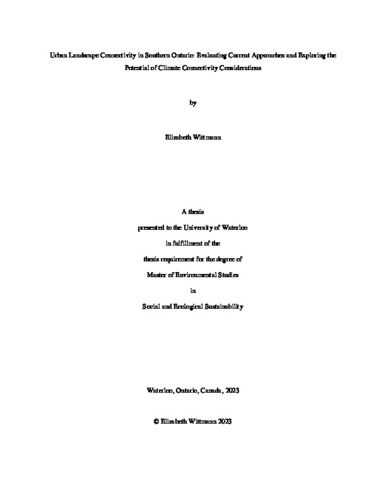| dc.contributor.author | Wittmann, Elizabeth | |
| dc.date.accessioned | 2023-06-16 13:20:31 (GMT) | |
| dc.date.available | 2023-06-16 13:20:31 (GMT) | |
| dc.date.issued | 2023-06-16 | |
| dc.date.submitted | 2023-06-15 | |
| dc.identifier.uri | http://hdl.handle.net/10012/19547 | |
| dc.description.abstract | Landscape connectivity facilitates the movement of organisms, is important for the maintenance of ecological integrity, and supports the resilience of ecosystems to withstand the impacts of climate change. Land use change resulting from urbanization increases landscape fragmentation and habitat loss which negatively impacts the foraging, dispersal, and migration capabilities of species which can result in decreases in species abundance, diversity, and overall ecosystem function. At the same time, climate change is driving shifts in the ranges of some species as a result of changes in the suitability of habitat and climate conditions. Southern Ontario is the most densely populated region in Canada and is expected to accommodate significant population growth over the next 20-30 years. As a result of the expected growth in this area, the long-term protection and enhancement of landscape connectivity will be an important consideration in southern Ontario. The objectives of this research were to assess the effectiveness of current approaches to protecting and enhancing landscape connectivity in southern Ontario and to examine ways urban areas can support species movement under climate change. These objectives were explored at two different scales. Finer-scale analysis was undertaken through a case study of Waterloo Region (“the Region”) using a combination of spatial and policy analysis. Using circuit theory, we modelled structural connectivity of forests and wetlands across the Region between 2000-2015. Then, we undertook content analysis of provincial and regional land use policies to examine the trends and evolution of land use policy guiding growth and development in the Region between 1996-2020 focusing on requirements to protect and enhance landscape connectivity. Our results showed that existing corridors have remained stable and land use policies for the protection of landscape connectivity have strengthened over time but also highlighted the need for greater emphasis on enhancing landscape connectivity within urban areas. Coarser-scale analysis was then undertaken to analyze existing climate connectivity literature to understand the potential role of urban areas in supporting broad scale ecosystem function and range shifts under climate change. Our analysis found very few discussions on the potential role of urban areas in supporting climate connectivity. In response, we present a perspective piece on potential opportunities for considering climate connectivity in conjunction with existing approaches to protecting and enhancing landscape connectivity. | en |
| dc.language.iso | en | en |
| dc.publisher | University of Waterloo | en |
| dc.subject | landscape connectivity | en |
| dc.subject | urban ecology | en |
| dc.subject | climate connectivity | en |
| dc.subject | land use | en |
| dc.title | Urban Landscape Connectivity in Southern Ontario: Evaluating Current Approaches and Exploring the Potential of Climate Connectivity Considerations | en |
| dc.type | Master Thesis | en |
| dc.pending | false | |
| uws-etd.degree.department | School of Environment, Resources and Sustainability | en |
| uws-etd.degree.discipline | Social and Ecological Sustainability | en |
| uws-etd.degree.grantor | University of Waterloo | en |
| uws-etd.degree | Master of Environmental Studies | en |
| uws-etd.embargo.terms | 0 | en |
| uws.contributor.advisor | Trant, Andrew | |
| uws.contributor.advisor | Trant, Andrew | |
| uws.contributor.affiliation1 | Faculty of Environment | en |
| uws.published.city | Waterloo | en |
| uws.published.country | Canada | en |
| uws.published.province | Ontario | en |
| uws.typeOfResource | Text | en |
| uws.peerReviewStatus | Unreviewed | en |
| uws.scholarLevel | Graduate | en |

